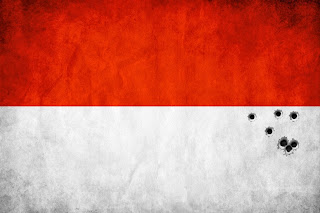In conjunction with the 13th World Day Against the Death Penalty, local rights groups have renewed their call for the government to abolish the death penalty, especially for drug convicts, as the penalty has failed to offer any meaningful deterrent effect.
Data from the Community Legal Aid Institute (LBH Masyarakat) revealed that from May, or a month after the government conducted the 2nd round of this year's executions, to August, the National Narcotics Agency (BNN) carried out 10 large-scale drug raids, seizing 70 kilograms of methamphetamine, 235 kilograms of marijuana and 700 ecstasy pills.
"If we include data on raids by the police. The number would be higher," Ricky Gunawan of LBH Masyarakat said Thursday in Jakarta.
He said the data showed that the application of the death penalty was not an effective measure to combat drug-related crimes.
In recent years, Indonesia had appeared to be shifting away from the death penalty, in line with the global trend toward abolition. However, President Joko "Jokowi" Widodo, decided to embrace the practice, claiming that Indonesia was facing a drug emergency.
Since he took power in October 2014, he has allowed firing squads to execute 14 inmates convicted of drug-related offenses, the highest number of convicts executed since the country first implemented the penalty in 1980.
This year's executions were divided into 2 rounds. Australians Andrew Chan, 31, and Myuran Sukumaran, 34, the ring leaders of the so-called Bali 9, were among the executed convicts shot in the 2nd round. Both were sentenced to death for smuggling 8.3 kg of heroin from Bali to Australia in 2005.
 |
| Executed on April 29, 2015 |
They had been detained for years at Kerobokan Prison in Bali before President Jokowi eventually rejected their clemency pleas and let the firing squad pull the trigger on April 29 this year.
The government will likely execute another 14 inmates next year. However, Attorney General HM Prasetyo said that his office had yet to determine the exact number of convicts to be executed.
Poengky, executive director of the human rights watchdog Imparsial, said that President Jokowi's firm stance on executions appeared to be primarily a public relations stunt.
"President Jokowi is trying to show that he promotes clean and firm governance," Poengky said. "He seems to be trying to reduce Indonesia's reputation as a corrupt nation with an unreliable legal system."
She said that it would be better for President Jokowi to allow the convicts to become justice collaborators to uncover more drug cases in the country. By killing them, she argued, the President lost any chance to hunt down more important perpetrators.
Wahyu Wagiman, the executive director of the Institute for Policy Research and Advocacy (ELSAM), said that the death penalty inflicted mental suffering on death-row inmates because many spent years in detention fearing for their lives.
"The long detention period prior to the execution shows that the country's legal process lacks humanity," Wahyu said.
A study from the Institute for Criminal Justice Reform (ICJR) released in April 2015 revealed that the government handed down around 42 death sentences from 2002 to 2013, 11 of which were the result of an unfair judicial process. Jan Pronk, former Dutch development cooperation minister, said that Indonesian should follow the worldwide trend of ending the death penalty.
"Studies show that about 40 % of those executed in the US were innocent. And in some countries they say drug abuse is a major disease. But the death penalty does not scare off criminals. In Mexico, the US, the real criminals are never found." Pronk told The Jakarta Post on Thursday.
Source: The Jakarta Post, October 9, 2015











